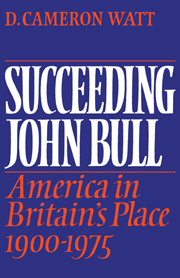Summary
The thirty years which followed the announcement of the Truman doctrine in March 1947 form a much longer period without major war than any of the periods hitherto covered in this study. The period presents a rather unusual picture when the generational divisions are compared with what are watershed years in the decline of British power and Anglo-American relations, the years of disaster 1963–4. In the space of one short twelve-month period, President Kennedy was assassinated and his team broken and divided by the adjustment to the succession. The advance of the multilateral force proposals destroyed the chances of American-led détente in Europe just at the time when its most obdurate opponent in Europe, Dr Adenauer, had finally been driven into retirement by the progressive elements in his party. Instead, President Johnson plunged his country blindly onwards into a policy of intervention in South East Asia and a conflict that America could not wage without destroying the culture, such as it was, to whose aid it had come, and could not win. In Britain the death of Hugh Gaitskell, followed by the enforced retirement of Harold Macmillan, saw the break-up of the Conservative party with the progressive loss of its outward-looking reformist wing and the advent to power of a Labour party already so bitterly divided that the new Premier, Harold Wilson, felt obliged to exercise a policy of party management most reminiscent of the policy of Count Taafe in the twilight of the Habsburg Empire, since it worked on the principle of keeping all factions in a state of balanced dissatisfaction.
- Type
- Chapter
- Information
- Succeeding John BullAmerica in Britain's Place 1900-1975, pp. 111 - 143Publisher: Cambridge University PressPrint publication year: 1984



